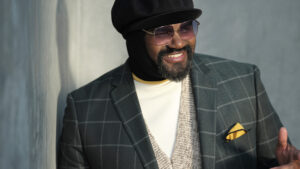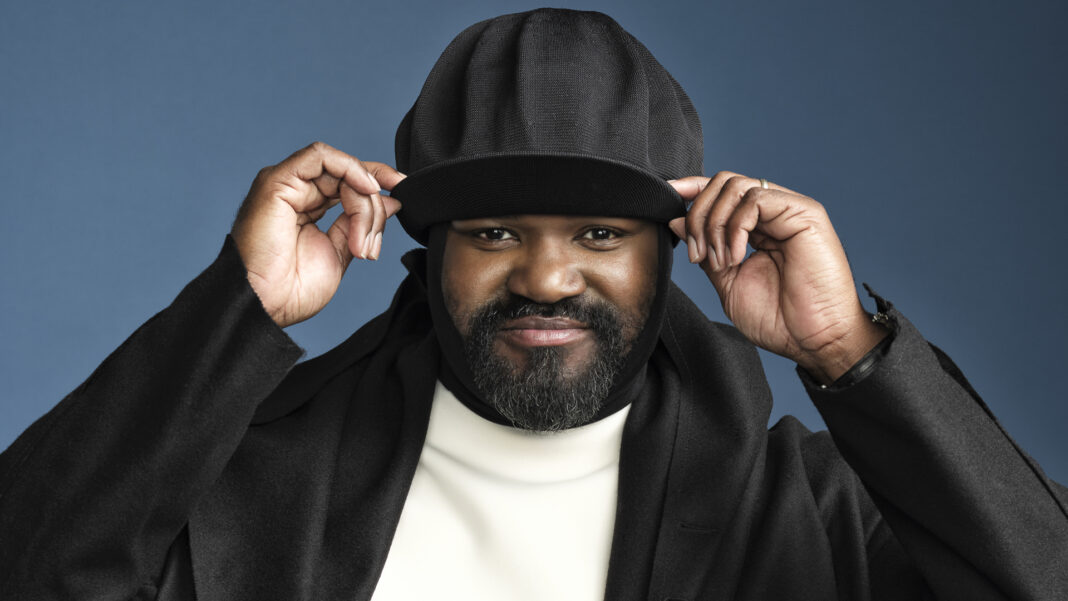By the time the album All Rise by singer/songwriter Gregory Porter was released in August of 2020, his song Revival seemed to be everywhere. It was embraced as the perfect song that encapsulated just what we all needed at the time. In fact, it may still be the song we need. Revival also appears on Porter’s latest release, Still Rising – The Collection.

Porter, a two-time Grammy Award-winner and a nominee this year for All Rise, is finally able to be back on the road performing songs from that album. He’s performing at the Scottsdale Center for the Performing Arts on February 9th, The Soraya in Northridge on February 10th and will be in Brooklyn for his Annual Valentine’s Day Concert on February 12th. Then it’s back on the road for more stops across America before heading to Europe.
As Porter told UK Vibe he hears “Donny Hathaway, Nat King Cole, Bill Withers” and “the familiarity to Gospel music in the songs of someone like Ray Charles” in his own voice and music.
Late last month I spoke by phone with Porter lessons learned during the pandemic, giving jazz its due credit and how his football injury in 1990 shaped his destiny. What follows are excerpts from our conversation that have been edited for length and clarity.
I want to start by asking you about something you Tweeted on December 30th. You said “It’s important to reflect on all the positives that have happened this year and learn from the hardships and gain strength and knowledge to be better.” What have you learned since All Rise was released in the middle of the pandemic?
Ultimately, what is most important thinking about the legacy, but not the big word legacy. I mean legacy in the small word. I think what is it you’re leaving with the people that are next to you. Even legacy on a day-to-day basis. How did you make people feel? What did you do when you were you? Were you a solid person? Were you a cool person or were you generous or helpful for this kind of thing? This is a thing that I’m obsessed with.
Upon making the record I didn’t know that it would be the last time being around my brother. I didn’t know that was our last steak dinner or the last glass of wine or last conversations, last laughs. You know I think about the week of that record and I think where’s the good when you leave the room? In a way that is optimistic. In looking at my career I think of all of the music that way. So good. This is a document of who I am. And I think it speaks to a reasonably decent person.
How does that thinking influence how you present yourself?
I think the change is maybe, in me, a mental thing. I still want to give the audience and say to the audience these things that I’ve written. But in a way I want to see more importance. Music became so important to me during the pandemic. It really lifted my spirits. As Americans we’re like nothing can touch us, but we haven’t been tested. Once you’re tested and your spirit is low what is it that brings you up? For me music really was uplifting. Even some of my own songs I wrote for other people’s heartache I used it for myself. I think understanding the power of music and what it is and what it can be. I want to really give them something that really lifts their spirit or moves them emotionally. Maybe this thing that I do has become more important to me.
In order to accomplish that how important is it for you to either mix up the set list or finding ways of keeping things fresh for you if you have a more fixed set list?
I don’t have the set list. I am calling off the top of my head. There are messages that I want to say to every group that are probably a career-wide message for me. The optimism that I have about who I am as a person. So I’ve written some songs that speak to that and I want to say those things. No Love Dying, Liquid Spirit, Take Me To The Alley, these are messages that I want to say to every audience that I stand in front of. So there are some staples, but there are some other things that I mix and match. You kind of feel the feeling of the room. Once you get a feel for the audience after two or three songs, you kind of take them on this music journey and you’re a deejay of your own music.
I’m not always thinking about playing for them the latest thing that’s being played on the radio. Because that thing may not be the very message that I want to give to them. I do feel like I am a messenger of the optimism of love. At the same time this is a craft. I am a jazz singer that employs all of the other cousins of jazz. But but that’s less important to me than the message here.
As a jazz singer what is the best way for an artist who writes new material and also embraces older songs to widen his or her audience and to make audiences understand the value of this material?
I tell you, there’s a little there’s a bit of dishonesty going on because a lot of modern writers are hip-hop artists. They’re borrowing elements from 70s soul music, from jazz, but they don’t say that. I think if you give the respect where the respect is due it’ll even bring the listener back to the original source of some of these samples, right? I’m not a person who wants to diminish anybody’s talent. I definitely can’t diminish hip-hop. it’s something that I appreciate as well.
But I think if people gave a little bit more energy sometimes to the influence or even the real source of some of these things. I think of a song like Kanye West’s Jesus Walks. He’s pulling from a whole bunch of influences: the jazz community and the origins of the big choir that’s just playing in the background. I think it would cause the listener to dig deeper. Why don’t they announce this? Or why don’t they make a big deal out of this? Because it connects the generations. Right? It connects genres. I think if it would be a beautiful thing to connect Miles Davis, Wayne Shorter, Bob James, Hubert Laws. It would be awesome to connect all those foundational artists in jazz to this genre.

Let me ask you to go back in time thirty-two years. If you could go back to 1990 after your rotator cuff injury and when you and when you first started to sing in clubs in New York, what advice would you give the younger version of yourself?
To be patient with myself. I didn’t believe that the journey was valuable in my career. I thought that if I don’t get this thing right now it’s never going to happen. I didn’t know that some of the difficulties would bring me a lot of seasoning for my career. I the things that I want to say I’ve figured out by trial and error. I had some doubts about music in the world. This moment has passed me by. I just needed to have patience. I would tell myself to just hang in there and I did. I can’t say that I didn’t have self-doubt and insecurity about my journey. I was like do I stick with this music? it’s my biggest love. Do I just put this out and become a bean counter or whatever it is I needed to be?
I’m assuming you are glad you didn’t do that?
I’m glad I didn’t do it. I did a whole bunch of strange things and strange jobs to stay afloat. But I am glad that I kept my eye on music. There are people that can become jaded and angry because they see other people advancing and themselves not. So, yeah, I’m glad that I stayed in love with music.
For details on Gregory Porter’s Tour Schedule, please go here.
All photos of Gregory Porter by Erik Umphery/Courtesy Blue Note RecordS










